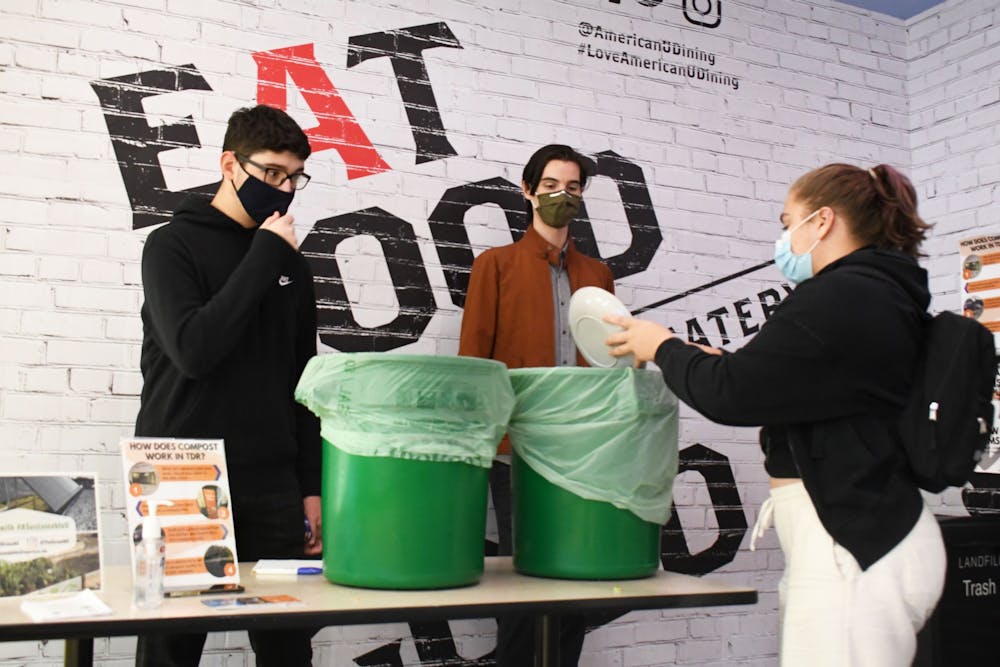From the Newsstands: This story appeared in our December 2021 print edition. You can find the digital version here.
This fall, the Office of Sustainability officially launched the EcoRep Program at American University in an effort to continue its commitment to the environment, providing a way for the student body to take sustainability on campus into their own hands.
While the program was piloted during the Mid-Semester Residential Experience last spring with a much smaller group of students, there are 40 undergraduate students who signed up as EcoReps this semester. EcoReps are required to volunteer two hours of their time each week to promote sustainability through individual behavior change among students, faculty and staff. School of Public Affairs sophomore Joel Ploski, who is an EcoRep, feels this requirement is easy to accomplish.
“The Office of Sustainability makes it really easy for us to do a wide variety of things,” Ploski said. “It can be anywhere from going to a climate strike to doing a waste audit.”
From staffing compost educational programs in the Terrace Dining Room to posting sustainability information on social media, there are many different ways to volunteer. Ploski volunteers his time by doing waste audits and waste sorting education in TDR. According to the Office of Sustainability, on the first three occasions that EcoReps tabled at TDR next to the dish return, they helped save 146 pounds of food waste from going to the landfill and being composted instead.
Recently, EcoReps have been promoting a new outreach program, EcoPledge, in which anyone on campus can pledge to take at least 10 different sustainable actions. Those who pledge receive a monthly newsletter with tips on how to complete their pledge commitments and can win environmentally-friendly prizes such as reusable straws.
“It kind of removes this stigma that sustainability might be something that is really difficult or intimidating to get into,” Ploski said. “Really it’s just like small, little steps that you take day by day. Just by doing those you can be a lot more sustainable.”
Mimi Beckemeier, an intern for the Office of Sustainability and a freshman in the College of Arts and Sciences, helps manage the EcoRep Program. She says she believes that increased individual action will amount to a more substantial change overall. While there is a big push among climate activists to focus on holding corporations and our government accountable, Beckemeier said that individual action is still important, especially at AU.
“When it comes down to it, the real way we’re going to end emissions and solve a lot of the issues is by regulating corporations,” Beckemeier said. “However, when we’re talking about AU, because we’re such a small school, we’re so close-knit that our impact is much larger.”
According to Tacy Lambiase, the Office of Sustainability’s communications and outreach manager in charge of the EcoRep Program, the importance of individual action goes beyond those efforts adding up.
“Individual actions are crucial because they act as a gateway for getting folks involved,” Lambiase said. “We’re asking students to take simple actions on campus like reducing their use of single-use plastics. That action alone is not going to solve the climate crisis, but if we can get students engaged and interested in doing one small action, they are more likely to take bigger actions down the road.”
Lambiase reports 182 students have already been certified with EcoPledge and the initiative will continue throughout the rest of the academic year. Additionally, EcoReps have been promoting CampusCup 2021 — a campaign to provide free menstrual cups on campus — alongside AU’s Health Promotion and Advocacy Center in efforts to alleviate typical menstrual waste and grant access to free reusable menstrual products. This campaign formed out of a partnership with the Office of Sustainability and AllMatters, a sustainable-period-product company. While the campaign ran, 452 students signed up to receive free reusable menstrual cups, according to the Office of Sustainability.
Outside of working with HPAC and promoting EcoPledge, EcoReps have also worked with senior capstone students in promoting a reducing food waste application, Too Good To Go. The EcoRep program will continue to work alongside different climate campaigns and intends to partner with climate groups on campus.
Applications to become an EcoRep will reopen next semester, and Lambiase recommends becoming an EcoRep as a great stepping stone for students to get involved.
“It’s definitely more fun and more effective to drive change when you're doing it with other people,” Lambiase said. “We don’t want students to feel like they're going at this alone.”





